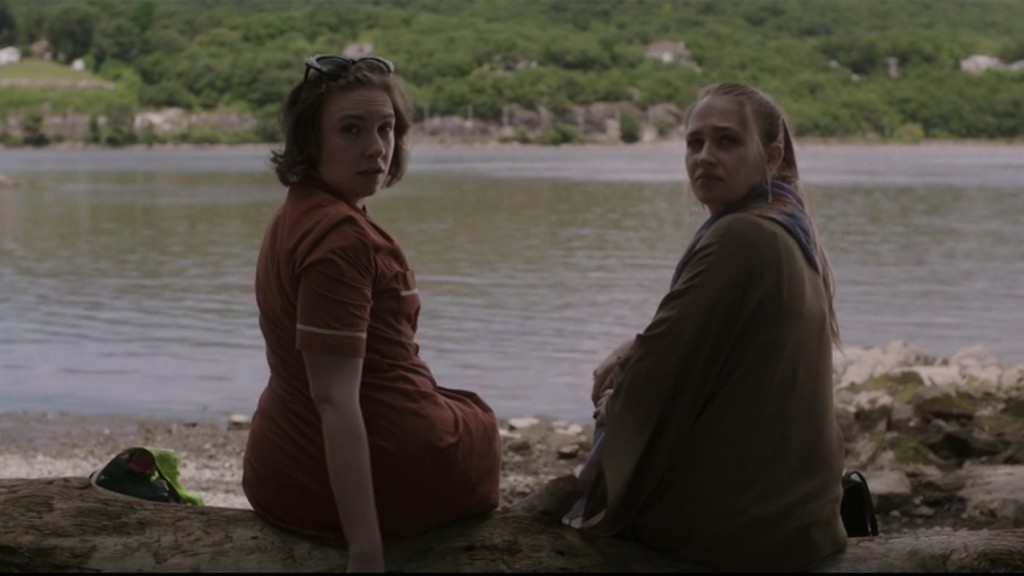A trip up the Metro-North has long been an act of refuge for New Yorkers. But in “Video Games”, an all Jessa-Hannah production in which we meet Jessa’s louse of a father and not much else happens – was Lena Dunham riding the rails to get away from her own looming storylines? Even at its most problematic, last week’s “Boys” was a dual voyage to the disparate worlds of Staten Island and the culture of the other boroughs’ young wealthy artists. “Boys” managed to be satisfying in its engagement of many characters, putting those characters in intriguing new settings and situations, advancing serial plotlines, and often looking gorgeous via Claudia Weill’s superb direction. In short: exactly what you want out of episodic TV. Yet this week, “Video Games” seems so uneventful and so lackluster when the chips are down, that many scenes seem plucked from another show entirely.
To begin on a positive note: Jemima Kirke stepped up her game after being a season-long weak link. While I think we’ve spoken at length about why Jessa is a difficult character to play: detached in a show of over-sharers, snarky despite having yet to display a capacity for much else, and often the brattiest, most entitled, and most oblivious of the quartet. That these reasons can be listed off with ease suggest if nothing else a kind of complexity, or at least oblique streak yet to be unraveled. Kirke’s range seems limited for now: she leans heavy on a mix of jet set pomposity and brow-furled pathos, looking each week more and more like Fiona Apple. Not that there’s anything wrong with that.
“Video Games” was written by Bruce Eric Kaplan, author of some of Seinfeld‘s most delightfully strange episodes, namely “The Merv Griffin Show”, “The Puerto Rican Day”, and “The Cartoon”, in which Kaplan lampooned his days as an artist for the New Yorker. He also penned some Six Feet Under, and “Video Games” feels decidedly in the latter, weaker camp. It was foremost disappointing to see Kaplan use the easy tropes of treating country folk as sheltered creeps. Even Jessa’s dad (Ben Mendelsohn of Animal Kingdom, in a truly inspired bit of casting), bored by nature and contemptuous of his new rural surroundings, is a hoarder of computers so old that they “look like doghouses” to Hannah. Rosanna Arquette captured her role as his latest belle Petula, albeit briefly. A clingy paranoia case, she is peripheral, taking a backseat to Mendelsohn (we learn little of her backstory, save that she was Dad’s masseuse in rehab) and even Frank, her introverted, middle-parted sad sack of a son.
Hannah says aloud she can’t tell the difference between loserly-looking attractive men and actual losers, and so she winds up having lousy sex with this nineteen year old lump which lasts all of eight seconds. “All you have to eat in your house is your pet rabbit, and I’m an undiagnosed hypoglycemic,” says a briefly enraged Hannah to Jessa, and for a moment the show is actually funny again, gaining some verbal traction. The scene of them driving on whippets with Frank and his blonde lacrosse-playing bi-curious pal was interesting if a bit of a cheap trick: genuinely suspenseful and felt like something from a totally different show. It is a rush of high drama in an episode low that feels too diverted. I don’t care as much about Jessa’s long-term trust deficiency as I do about finding out what Ray and his new dog named Dog are up to back in Brooklyn.
Jessa’s issues with her father’s immaturity and frequent abandonment fall flat in her swing set speech, in which she tried to tell him off but finally caved in, if only out of resignation, to his creeper charms. This is where Mendelsohn’s quiet, ominous seduction shines. He is an expert snake oil salesman who knows full well that others seek a moment of redemption from him, willing to dupe his own daughter time and again just to shirk life’s responsibilities. But the moment finally read like an anti-drug commercial in which flakiness and selfishness are narcotics, and a dead-eyed child bellows at a questioning parent: “I learned it from you, Dad!” A more effective tactic is heard in episode’s opening, when Jessa mutters to Hannah that it’s “lame that you care” about punctuality when Pops is late to pick them up in Manitou: Jessa has learned to depend on nothing and resents Hannah’s expectations for decency in others. Kirke is filmed beautifully as they’re sitting along the water, and it is apt to show how going to the country changes one’s various complexions, exterior and internal alike.
Jessa ditching Hannah at episode’s end seems to hammer the message – perhaps too hard – that hurt people hurt people: those who bail have been previously bailed upon. The subsequent scene delivers Becky Ann Baker and Peter Scolari as Hannah’s ‘rents, whom she amusingly thanks for being “like a hammock under the earth”. Perhaps most impressive in the entire thirty minute span was this expertly performed scene from Baker and Scolari, wince-worthy as her pampering father and vitriolic, take-no-prisoners mom. Hannah’s phone call amidst her tortured roadside pee amidst a urinary tract infection suggests that we can only offer our love, and that the offer is what’s paramount, with no certainty that the ardor we be returned as we would hope.
Follow Vol. 1 Brooklyn on Twitter, Facebook, Google + our Tumblr, and sign up for our mailing list.

